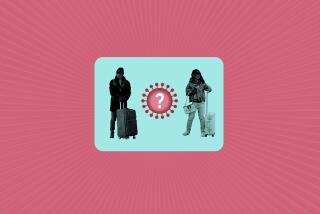Avoid Being Victimized
- Share via
It happens very quickly. A group of Gypsy children surround you and before you realize it you’re jostled, a newspaper is stuck in front of your face--and in the confusion your wallet disappears.
Another problem frequently reported abroad is motor scooters that follow walkers, quietly pull up beside them, then the passenger grabs a handbag or necklace. If victims resist, they can be pulled off the sidewalk and into the traffic.
Your best protection is to avoid looking like an easy victim. Don’t carry a shoulder purse; use a day pack. And keep your money, traveler’s checks, tickets and passport in a money pouch under your clothing.
You should also leave a copy of the numbers of your checks, tickets and documention with someone at home, in case you lose everything.
Other Precautions
Here are other ways to avoid serious problems abroad:
Another country may regard you as one of its citizens. You could be subject to special taxes or military duty if you enter that country. Check your status with the diplomatic office of that country before you leave home.
Read about the customs of countries before you visit. For example, women in shorts will find that some countries consider this mode of dress offensive, and alcohol is strictly prohibited in most Muslim countries.
If you are taking trains, be careful of people who seem too friendly. I’ve heard reports from Europe and Asia of tourists being drugged and robbed when they accepted food or drinks from strangers. Unwatched drinks in bars also can be doctored.
When driving in Europe be wary of motorcyclists near toll booths. Tourists report this scenario: While they are stopped at a toll booth a tire is punctured. Several kilometers later the motorcyclists pull up beside the car, indicate that the tire is flat, and pull over with the car to “help.” While one cyclist offers to help and draws attention, the other removes articles from the car.
Avoid Drugs Abroad
Two major foreign travel problems are missing-person reports and drug arrests.
Leave an itinerary with your family or a friend at home, tell them when you are going to touch base and stick with it. Families should keep in mind that it’s not always possible to call at the planned moment.
In the great majority of these cases, the person couldn’t make the call--the phone where they were didn’t work, they were out of money, or they decided to spend a few days in a remote area where there wasn’t a phone.
Never cross a border with a hitchhiker, or if you’re hitchhiking, don’t cross with an unknown driver.
Even if the atmosphere is permissive and drugs are readily available, it doesn’t change the fact that they are illegal. You are subject to the laws of the country you are in, and penalties can be severe.
In 1986 two Australians were executed in Malaysia for possession of 180 grams (6.3 ounces) of heroin. Many travelers arrested for possession of drugs, particularly in Latin America and the Caribbean, claim that the drugs were planted on them (dropped into an open Jeep or placed in hand luggage).
It’s a natural defense, says Robert Lapointe, head of consular assistance for Canadians. “But I have no doubt that it can happen and no doubt that it is happening.”
So keep an eye on your belongings, and never accept gifts from strangers or carry anything through customs for someone else.
More to Read
Sign up for The Wild
We’ll help you find the best places to hike, bike and run, as well as the perfect silent spots for meditation and yoga.
You may occasionally receive promotional content from the Los Angeles Times.






